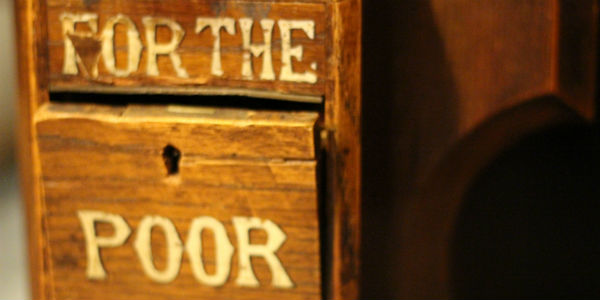Republicans give more to charity – but not because they oppose income redistribution
Who gives more to charity – Republicans or Democrats? Michael Sances (University of Memphis) and Michele Margolis (University of Pennsylvania) found that conservative Americans donate more, even when socio-economic differences are taken into account. Could this be because they support a smaller role for the state, or as an effort to signal their philanthropic credentials? In fact, it is because Republicans attend church more frequently and donate through their congregations. If Republicans and Democrats are culturally divided, these divisions appear to have little if anything to do with disagreements about public policy.

Photo: Joshua Morley via a CC-BY 2.0 licence
It seems as if Democrats and Republicans can’t agree on anything, even when it comes to decisions that have nothing to do with politics: where to live, what television shows to watch, and even what to name children. How far do these differences really extend, and to what extent are they driven by policy disagreements? In a recent article in Political Behavior, we explore these questions by looking at partisan differences in an important, yet relatively unexamined apolitical activity – charitable giving.
Over three-quarters of US charities’ revenues come from donations by individuals, and we used these individual giving decisions to learn about differences in “apolitical” behaviour by partisans. In three surveys, we asked whether Republicans and conservatives give more or less to charity than Democrats and liberals. While political identity and giving are measured slightly differently across the surveys, the results are consistent: Republicans and conservatives report donating between $60 and $160 more per year to charity than Democrats and liberals. This result holds even when we account for socio-economic measures that are correlated both with political identity and charitable giving. The baseline difference in giving behaviour comports with what others have found: partisanship is a dividing line not only in terms of choosing candidates and policies, but also in how partisans spend their disposable income.
Having established the difference, we next wanted to know why a partisan gap in giving appears. We tested three potential explanations – religious identity, political beliefs, and economic status.
We found the strongest support for the religious explanation. Republicans are not only more likely to attend church than Democrats, but church attendance – among Democrats and Republicans alike – is strongly associated with charitable giving. Gaps in giving, therefore, are linked to differences in the social composition of the parties, in which the average Republican is more religious than the average Democrat. Moreover, the overall giving gap emerges because Republicans donate more to their own religious congregations, rather than nationally active religious charities. Republicans and Democrats give roughly equal amounts to religious organisations aside from their own congregations, and we also find some evidence that Democrats donate more to non-religious organisations than Republicans. In other words, the baseline difference in charitable giving emerges because Republicans are more religious than Democrats, and religious people donate generously to their religious congregations.
We find no support for the claim that political beliefs drive differences in giving. It is possible that Republicans donate more to charity due to their ideological beliefs – indeed, conservative politicians in the US often claim that the government should get out of the way and let the charitable sector provide services. Republicans on our surveys might signal their opposition to income redistribution and support for private service provision by donating to charitable causes, substituting donation behaviour for support for government redistribution. Borrowing from Ellis and Stimson’s distinction between symbolic conservatives – those who merely call themselves conservative, but do not oppose government redistribution – and operational conservatives – those who hold conservative beliefs about the role of government – we find no evidence that political beliefs explain why Republicans donate more than Democrats. Republicans who are strong operational conservatives, and therefore oppose government redistribution the most, do not give any more or less to charity than Republicans who support government redistribution. Thus, Republicans do not donate more to express their preference for private service provision over large government social service programmes.
Third, we tested whether Republicans donate more than Democrats due to a differing desire to signal high economic status, which is one of the explanations for the differences in baby names cited above. But we find little evidence that changing economic evaluations cause changes in levels of anticipated giving in the short term. Using the 2012 presidential election as a natural experiment, we show that Republicans’ perceptions of their economic status, as well as their reported spending on vacations, declined following the re-election of Democrat Barack Obama. However, giving behaviour was unaffected by the election, reinforcing our conclusion that differences in giving come from differences in religiosity, not politics or economics.
Our findings have important implications for how we think about politics and charitable giving. It is a fact that there are differences in giving patterns between Democrats and Republicans. However, these differences stem from underlying differences in the social compositions of the parties, rather than from differences in ideological beliefs or a desire to signal status. In particular, the partisan gap appears because of a difference in a very specific type of giving, donating to one’s own congregation or house of worship. We find no conservative advantage when it comes to non-religious charities, or even religious charities beyond one’s own congregation. The large religiosity gap that exists in American politics today, coupled with the tendency of religious Americans to donate to their own churches, helps explain the overall partisan difference in charitable giving. To the extent that Republicans and Democrats are culturally divided, these divisions appear to have little, if anything to do with disagreements about public policy.
This post represents the views of the authors and not those of Democratic Audit.
 Michael Sances is an Assistant Professor in Political Science at the University of Memphis. His research focuses on political institutions in American politics, especially at the state and local level. He is particularly interested in whether institutional reforms intended to improve democratic accountability – such as direct elections and direct democracy – actually achieve their desired effects.
Michael Sances is an Assistant Professor in Political Science at the University of Memphis. His research focuses on political institutions in American politics, especially at the state and local level. He is particularly interested in whether institutional reforms intended to improve democratic accountability – such as direct elections and direct democracy – actually achieve their desired effects.
 Michele Margolis is an Assistant Professor in Political Science at the University of Pennsylvania. Her research interests are in American politics with a focus on public opinion, political psychology, religion and politics, and experimental methods.
Michele Margolis is an Assistant Professor in Political Science at the University of Pennsylvania. Her research interests are in American politics with a focus on public opinion, political psychology, religion and politics, and experimental methods.





 Democratic Audit's core funding is provided by the Joseph Rowntree Charitable Trust. Additional funding is provided by the London School of Economics.
Democratic Audit's core funding is provided by the Joseph Rowntree Charitable Trust. Additional funding is provided by the London School of Economics.